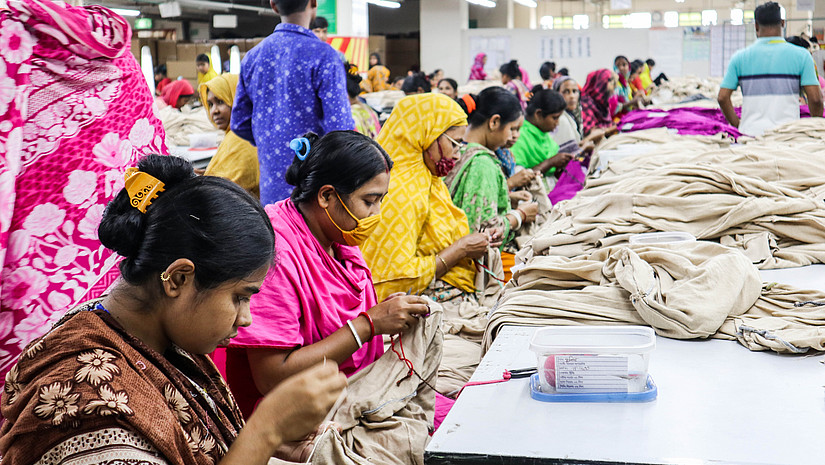Developing a training concept for building sustainability-related capacity among mid-level managers in the Bangladeshi garment industry
Contact
Project's Aims
The project conducts a systematic needs analysis in companies within the Bangladeshi garment sector with the aim of identifying the qualification gap among managers regarding criteria of responsible management including the social and ecological dimension.
Based on the results of the needs analysis, a modular training concept, including teaching materials for garment sector managers is devised and pilot training material is developed together with the Faculty from University of Dhaka (DU).
Furthermore, based on the training material, two pilot training courses are sequentially implemented by the partners in Bangladesh with the purpose of helping garment sector managers assuming responsible management practices towards the environment, workers and in particular women. After evaluation, the material and course implementation are meant to be further developed and refined in follow-up projects.
Evaluation and development of a strategy for anchoring the trainings in the suitable institution.
Abstract
The research goal of the project “Developing a training concept for building sustainability-related capacity among managers in the Bangladeshi garment industry” is to conduct a systematic needs analysis in companies within the Bangladeshi garment sector with the aim of identifying the qualification gap among managers regarding criteria of responsible management including the social and ecological dimension.
Based on the results of the needs analysis, a modular training concept, including teaching materials for garment sector managers will be devised and pilot training material developed together with the Faculty from the University of Dhaka (DU). This goal fits with the long-term research objective of the German-Bangladesh Higher Education Network for Sustainable Textiles (HEST), commissioned by the German Federal Ministry for Economic Cooperation and Development (BMZ), to improve the capacities of public and private universities through the university networks of Germany and Bangladesh. The HEST project aims to narrow down the skill gap of mid-level managers in line with the requirements of the industry and the responsible corporate management practices.
Activities
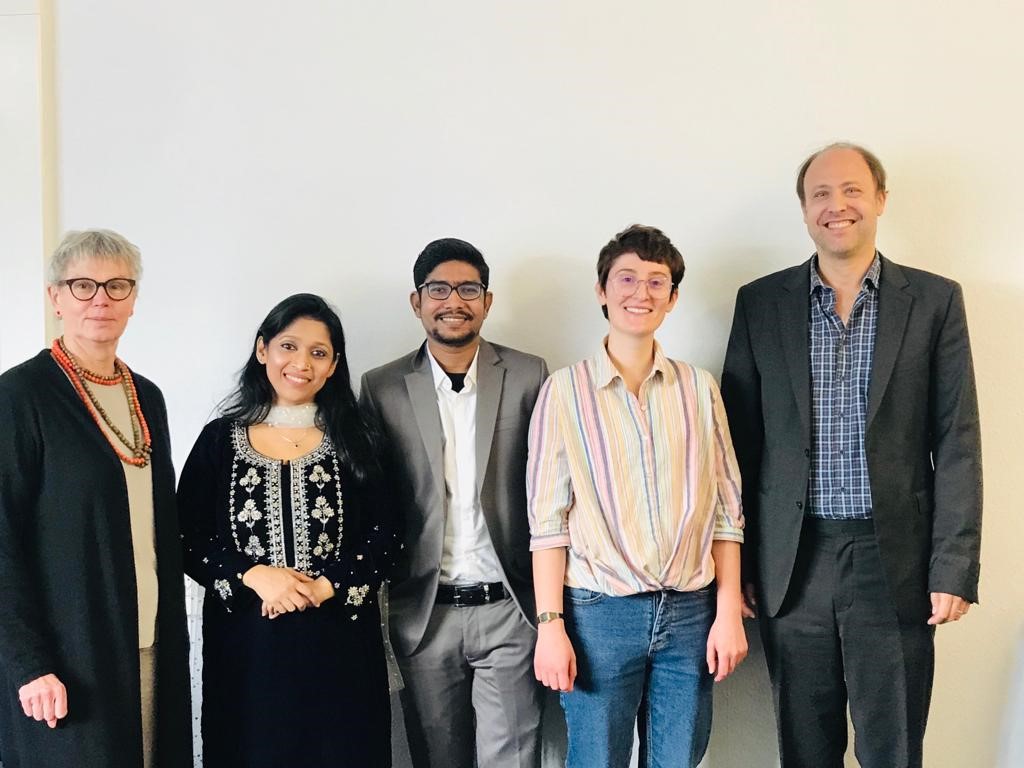
The expert workshop at the University of Kassel was organized as part of the project “Developing a training concept for building sustainability-related capacity among mid-level managers in the Bangladesh garment industry” (Bangla-tex), conducted by two partner universities, University of Dhaka (DU) and University of Kassel (UKS).
The second expert workshop was organized from 15-17 of October 2019 at the University of Kassel. The purpose of this meeting was twofold. First, it aimed at fostering exchange between academics from Germany and Bangladesh with an interest in the broader area of responsible management in the textile sector. Second, the partner project teams discussed the results from the two pilot trainings held in Dhaka in June and July 2019, project’s rollout strategy and final reporting.
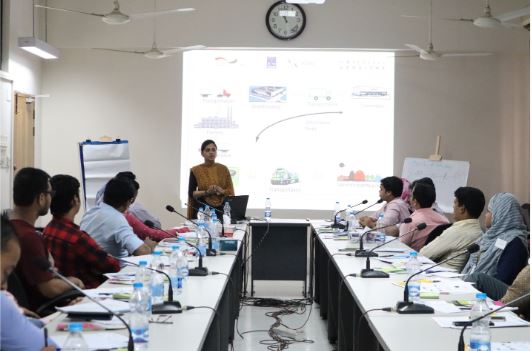
The second pilot training for the mid-level managers working in the Bangladeshi garment industry took place on the 26thand 27thof July at the premises of the Center for Advanced Research in Sciences (CARS) of Dhaka University.
The workshop comprised interactive and analytical sessions on sustainable supply chain management, gender diversity management, soft skills, and occupational health and safety. In the course of the workshop, all of the 28 participants put forward the problems they frequently face in their workplace. The modules allowed them to understand how they can adhere to gender-sensitive language and action and reap the benefits of effective supply chain management, soft skills and occupational safety standards to maximize their productivity and contribute to the betterment of working conditions in the Bangladeshi garment sector. The workshop ended with handing certificates to the participants and collecting their feedbacks for improving future workshops.
This training was organized as part of the project “Developing a training concept for building sustainability-related capacity among mid-level managers in the Bangladesh garment industry”, conducted by two partner universities, University of Dhaka (DU) and University of Kassel (UKS). The project is part of the “German-Bangladesh Higher Education Network for Sustainable Textiles (HEST)” commissioned by the German Ministry for Economic Cooperation and Development (BMZ) and is administered through the German Development Cooperation (GIZ). The objective of HEST is to create a university network between the German and Bangladeshi universities that fosters an exchange of research and qualification services in accordance with the prerequisites of responsible corporate management in the garment sector.
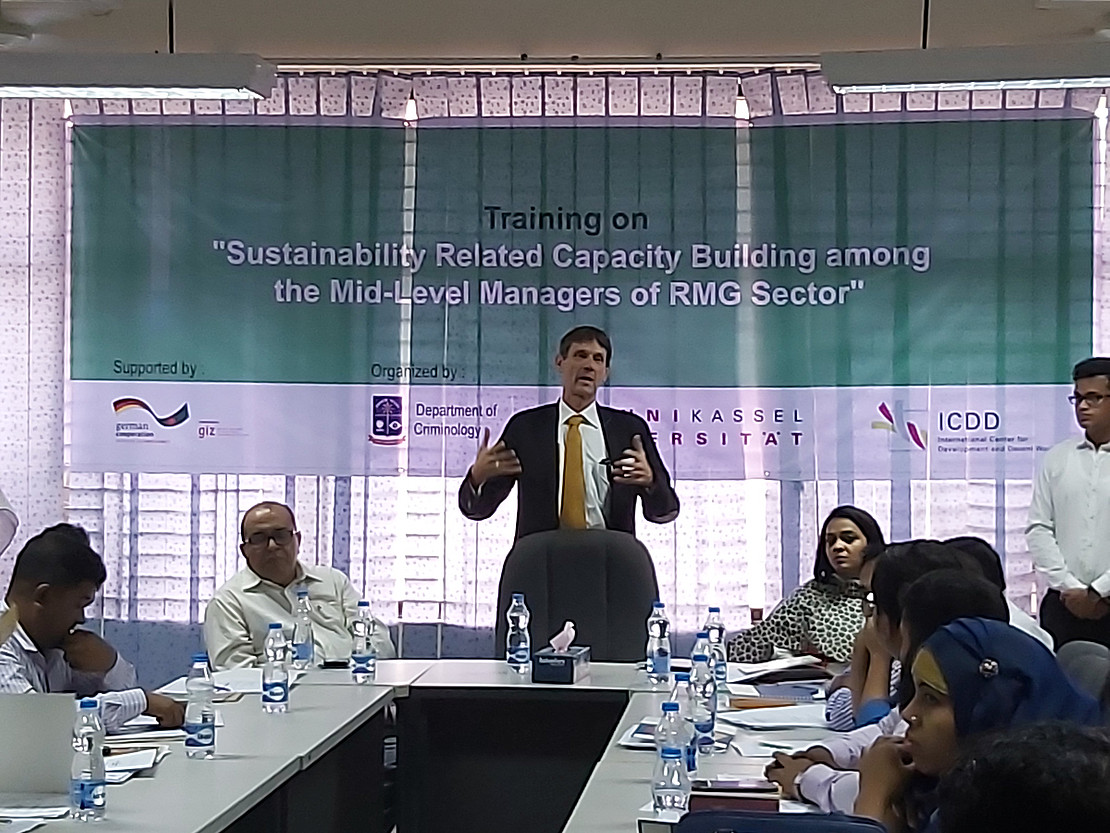
A two-day long workshop on ‘Sustainability Related Capacity Building for the Mid-Level Managers of the RMG Sector’ concluded today 29 June 2019 at the Center for Advanced Research on Sciences (CARS) of Dhaka University. This workshop was jointly organized by Dhaka University Criminology Department, the Kassel University of Germany and the International Centre for Development and Decent Work (ICDD).
Prof. Dr. Zia Rahman, Chairperson of Dhaka University Criminology Department, Prof. Dr. Christoph Scherrer of Kassel University, Germany and some DU teachers presented key-note papers at different sessions of the workshop.
Earlier the Department of Criminology of Dhaka University and Kassel University of Germany jointly conducted a research on the Ready-Made Garments sector of Bangladesh. On the basis of the results of this research this 2-day long workshop was arranged at Dhaka University for the mid-level managers of garments sectors.
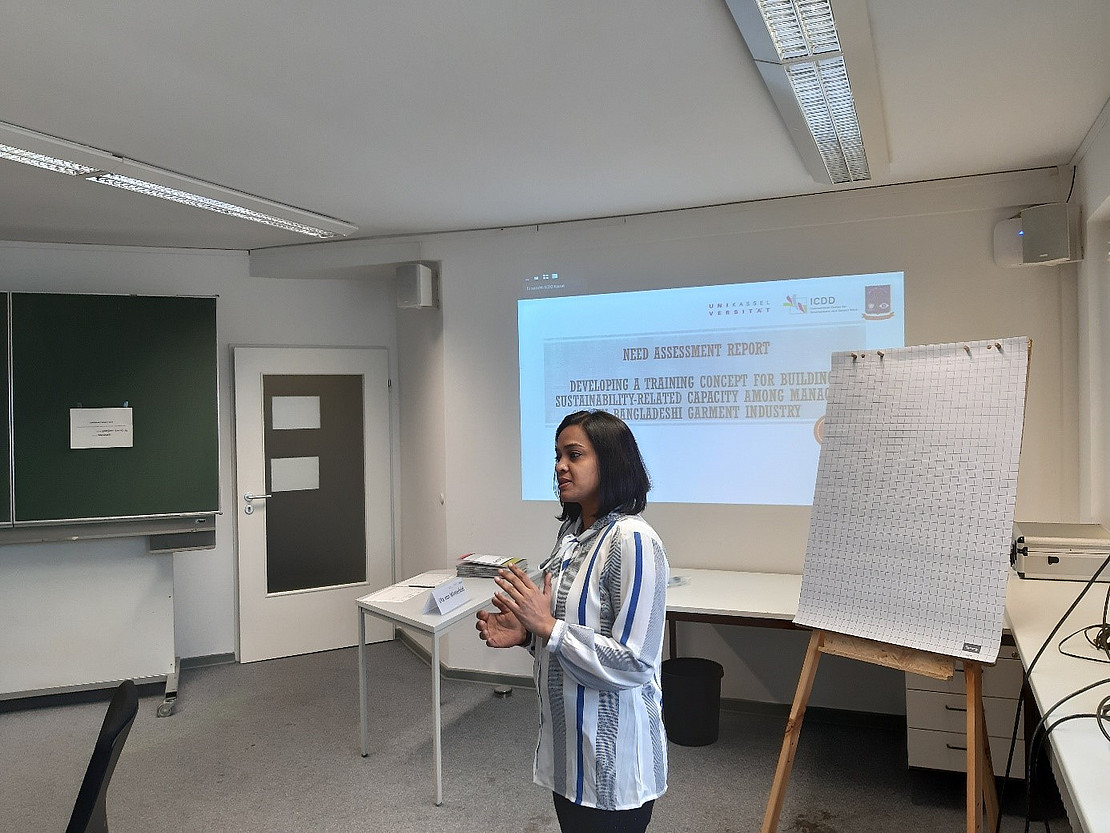
The expert workshop at the University of Kassel was organized as part of the project “Developing a training concept for building sustainability-related capacity among mid-level managers in the Bangladesh garment industry” (Bangla-tex), conducted by two partner universities, University of Dhaka (DU) and University of Kassel (UKS).
The workshop organized from 3-5 of April 2019 at the International Center for Development and Decent Work (ICDD) at the University of Kassel aimed at convening key project partners from DU, project staff and further experts from the UK together with pertinent external experts from other Universities and research institutes in Germany.
The purpose of this meeting was twofold. First, it aimed at fostering exchange between academics from Germany and Bangladesh with an interest in the broader area of responsible management in the textile sector. Second, it helped at validating the needs assessment and the training concept by a broader expert base, gave conceptual input and strategic guidance to the preparation and elaboration of training materials, and was a stepping-stone towards the planning and implementation of the pilot training courses in Bangladesh.

In February (10-14) 2019, the HEST project, DAAD and UGC jointly organized a ‘coordination forum’ where along with project stakeholders, key personnel from the university partnerships belonging and their industry partners participated to formulate, develop and publish recommendation on demand-driven higher education need in the textile sector of Bangladesh. The objective of the coordination forum was to bring together theGerman and Bangladeshi university partners with relevant stakeholders to facilitate the exchange of information and foster networking among themselves as well as with key stakeholders from the industry.
On the 11th of February, a workshop on Formulating Recommendations on Demand Driven Higher Education Needs in the Textile and Garment Sector of Bangladesh took place at the UGC. The German and Bangladeshi university partners, University Grants Commission(UGC), DAAD and GIZ participated in the workshop with the aim of formulating recommendations on demand-driven higher education needs in the textile and garment sector based on their specific project experiences.
One day of the forum was dedicated to factory visits and giving participants the opportunity to get insights in the work setting of textile professionals who are recognized as “best in class” textile enterprises. The goal of these visits was to learn about the measures the factories have put in place so far in order to improve social and environmental standards and to acquire more knowledge about difficulties and skill gaps that factory owners and compliance managers face.
One of the highlights of the week was the Conference on February 14th titled Demand Driven Higher Education Needs in the Textile and Garment Sector of Bangladesh. The objective of the event was to bring together the university partners with relevant stakeholders from the private sector, so that the recommendations for demand-oriented tertiary education in the textile sector could be presented to a broader audience.
The partnership consisting of the University of Kassel and Dhaka University working on the development of modular training for the industry mid-level management for the reduction of their skill gap mainly in social and environmental aspects with ‘gender’ being the cross-cutting issue. Until now the partnership has conducted one workshop in Bangladesh and one in Germany and aiming to further conduct two training workshops in Bangladesh and one coordination and expert workshop in Germany. Currently, the partnership is conducting a needs analysis in the textile and garment sector of Bangladesh and the result from the analysis will form the basis for further development of training modules.
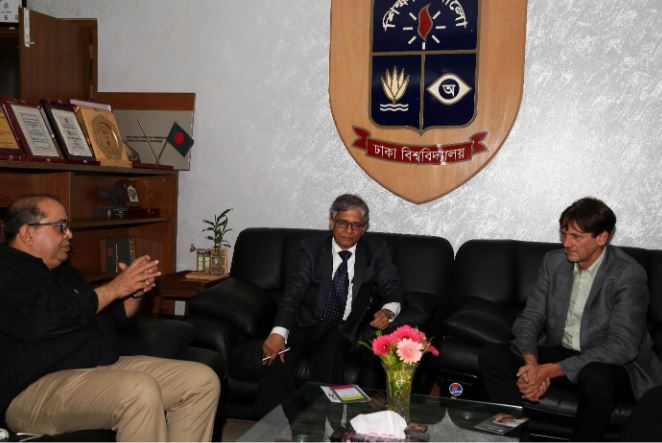
Starting from October 2018, the University of Kassel (UK) and University of Dhaka (UD) is implementing the project “Developing a training concept for building sustainability-related capacity among managers in the Bangladeshi garment industry”. The aim of this project is to conduct a systematic needs analysis in companies within the Bangladeshi garment sector, identify the qualification gap among mid-managers regarding criteria of responsible management including the social and ecological dimensions. With results of the needs analysis the two project partners will develop materials and conduct two pilot training programs.
This project is connected to the ‘German-Bangladesh Higher Education Network for Sustainable Textiles (HEST)’ commissioned by the German Ministry for Economic Cooperation and Development (BMZ) and is administered through the German Development Cooperation (GIZ). The objective of HEST is to create a university network between the German and Bangladeshi universities that fosters an exchange of research and qualification services in accordance with the prerequisites of responsible corporate management in the garment sector.
The representatives of the project team from the International Center for Decent Work and Development (ICDD) at the University of Kassel, led by Prof. Dr. Christoph Scherrer, visited Prof. Dr. Zia Rahman and his research team at the University of Dhaka for the project kick-off meeting from 8th to the 12th of October 2018. A solid frame for the work relationship was established, project timeline, activities and research strategy were discussed.
The project teams were invited to meet the Vice-Chancellor of the University of Dhaka, Prof. Dr. Md. Akhtaruzzaman. During the meeting, the partners agreed to sign a Memorandum of Understanding (MoU) between the two universities which will create a very good basis for future research cooperation and exchange. This will be the first MoU signed by the University of Dhaka and a German University.

